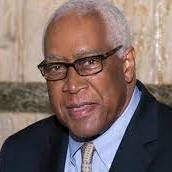 Robert Holland Jr. may have been the first in many situations, but he wanted to make sure he would not be the last.
Robert Holland Jr. may have been the first in many situations, but he wanted to make sure he would not be the last.
He was born April 11, 1940, and grew up in racially segregated Albion, Michigan. He recalled seeing a cross burned on the front lawn of his family’s home after they moved into a “white” section of town when he was four years old.
Though his high school guidance counselor had tried to steer him toward attending a trade school, Holland persevered and attended Union College in Schenectady, New York. He majored in mechanical engineering, lettered in three varsity sports, and served as class president for all four years. He was awarded the college’s prestigious Daggett Prize, given each year to a senior of exemplary “conduct and character.” He went on to earn an M.B.A. from the Zicklin School of Business at Baruch College (CUNY).
In the 1960s, Holland helped integrate the ranks at Mobil Oil Company and became the first Black partner at McKinsey & Company, the consulting firm where he became known as a “turnaround expert” for major corporations. He founded and managed several companies, including Rokher-J, Inc., City Marketing, Gilreath Manufacturing, and WorkPlace Integrators Franchise. He served as a director on numerous corporate boards including Carver Federal Savings Bank, Lexmark International, the Essex Lake Group, Lexmark International, Neptune Orient Lines, MONY, and the African American Advisory Board of PepsiCo. He was also a founding director of the restaurant chain YUM Brands.
In 1995, Holland joined the handful of African Americans to hold the title of CEO of a publicly traded corporation (and the first African American CEO of a majority owned franchise company) by being appointed CEO of Ben & Jerry’s Ice Cream. Through a nationwide contest, the company had invited 100-word applications from anyone interested in the position. Though Holland was discovered by a search firm, he submitted a poem of his own at the time of his hiring. In “Time, Values, and Ice Cream,” he recalled Albion's segregated “ice cream place on Main — swivel stools, cozy booths, and sweet, sweet smells with no sitting place for all of some of us.”
Holland was committed to philanthropy and to improving educational opportunities for poor and minority young people.
He was Chairman of the Board of Trustees of Spelman College in Atlanta, Georgia, where he served as a trustee for 25 years. He founded the Make-A-Difference Dropout Prevention Program in Detroit, Michigan, and served on many boards, including the Advisory Board to the NCAA, the Board of the Harlem Junior Tennis Program, the New York City Board of Children’s Aid Society, and the Lincoln Center Theater.
He was member of RCSA’s Board of Directors from 1997-2010 and continued to provide valuable counsel after his term ended.
He is survived by Barbara, his wife of 56 years, their three children, Robb, Kheri and Jackie, and three grandchildren, Miles, Kayla and Maya.
Sources:
